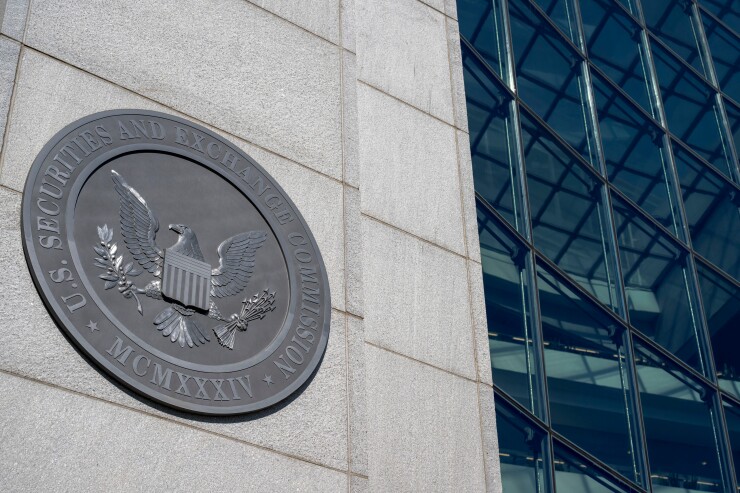A new line of yield-chasing crypto funds is forcing the Securities and Exchange Commission to confront unresolved gaps in its regulatory framework, just as the Trump administration eases oversight of digital assets.
The immediate dispute centers on two proposed funds from ETF firms REX Financial and Osprey Funds that would allow investors to earn rewards by deploying ether and solana tokens to help validate blockchain transactions, a process known as staking. The firms said they had cleared an initial SEC registration hurdle last week, but agency staff took the unusual step of objecting that very same evening. Staff warned the products may not meet standards to qualify as investment companies under federal law, raising broader questions about regulation of a hot corner of the crypto-investment world.
READ MORE:
SEC staff noted that to meet the definition of an investment company, a firm must primarily invest in securities. That's a problem when it comes to digital assets: there are no clear lines around what crypto activities trip securities laws and what don't.
"When ETFs generate income from staking, they may start to resemble traditional investment companies under the Investment Company Act — especially if investors are relying on the managerial efforts of others to earn those returns," said Adam Gana, an attorney at law firm Gana Weinstein LLP. "However, these types of ETFs are testing the boundaries of what counts as an investment company, and the SEC is sending mixed signals."
READ MORE:
Gana added that "just because you throw some stocks into the mix doesn't mean the SEC will look the other way."
The SEC, REX and Osprey declined to comment. The general counsel at REX said earlier that the firm expected to satisfy the SEC's questions.
The crypto industry has long-argued that many tokens aren't securities and shouldn't fall under the SEC rules. Under Trump, the agency has appeared open to these arguments and its new chair, Paul Atkins, is a proponent of digital currencies. SEC staff guidance has signaled that memecoins and stablecoins may fall outside securities definitions.
As recently as May 29, the staff said federal securities laws generally don't apply to staking activities — further complicating the regulatory picture as firms try to launch novel products.
These piecemeal statements create inconsistent policy, according to Corey Frayer, director of investor protection at the Consumer Federation of America.
"The SEC and the industry don't get to treat crypto assets as securities when it's convenient, and not as securities when they want weaker regulation," said Frayer, who served as a senior adviser to former SEC Chair Gary Gensler, a frequent target of crypto industry scorn.
At the crux of the matter is the so-called Howey test, which comes from a 1946 Supreme Court decision that still governs securities classification. Under the test, an asset can be considered a security — and thus will fall under SEC purview — if investors contribute capital with the expectation derived from the managerial efforts of others. Bitcoin is generally considered a commodity but the status of other tokens like ether and solana are less clear.
SEC Commissioner Hester Peirce, head of the agency's crypto task force, took the unusual step of highlighting the SEC staff's queries about whether the proposed funds met the definition.
"I have those same questions," Peirce wrote in a post on X.
Donald Trump embraced the digital-asset industry during his reelection campaign, pledging to make the U.S. the "crypto capital of the planet." Since re-entering the White House, he has established a national stockpile of bitcoin, anointed a "crypto czar" and welcomed memecoin enthusiasts to a private dinner in Washington.
Firms have recently been successful in resolving SEC staff concerns about novel offerings. Earlier this year, agency staffers rebuked an ETF by State Street and Apollo Global Management — the world's first to invest in private credit — hours after the fund listed over concerns about the fund's liquidity and its ability to comply with valuation rules. The firms took action to rectify the issues.
Crypto executives are optimistic that U.S. regulators will eventually greenlight the staking ETFs.
"They've followed a crawl-walk-run approach — first futures ETFs, then spot ETFs, and hopefully staking ETFs," said Matt Hougan, chief investment officer at Bitwise Asset Management Inc., which acquired an ethereum staking platform last year. "I'm hopeful we'll get to the finish line soon."






